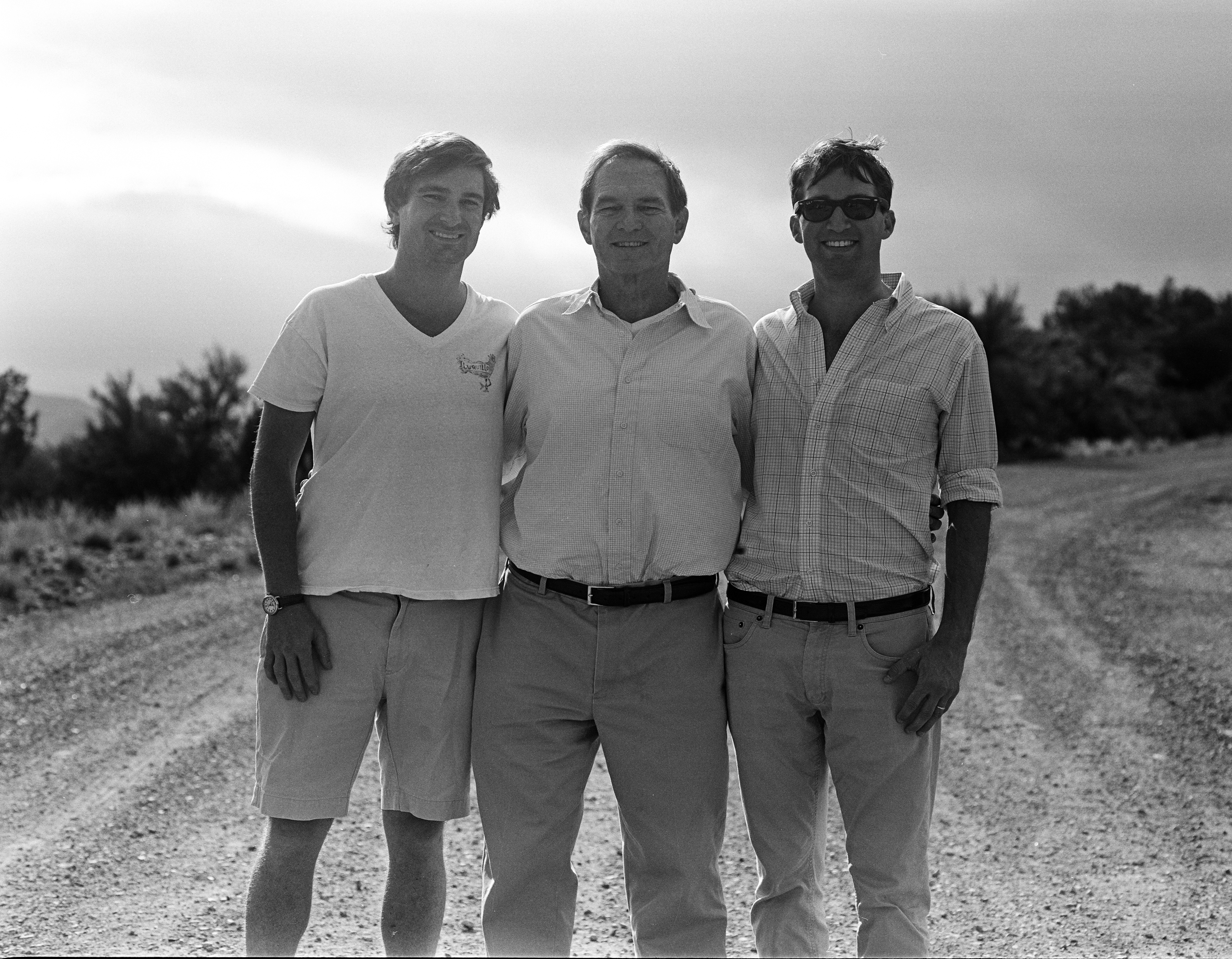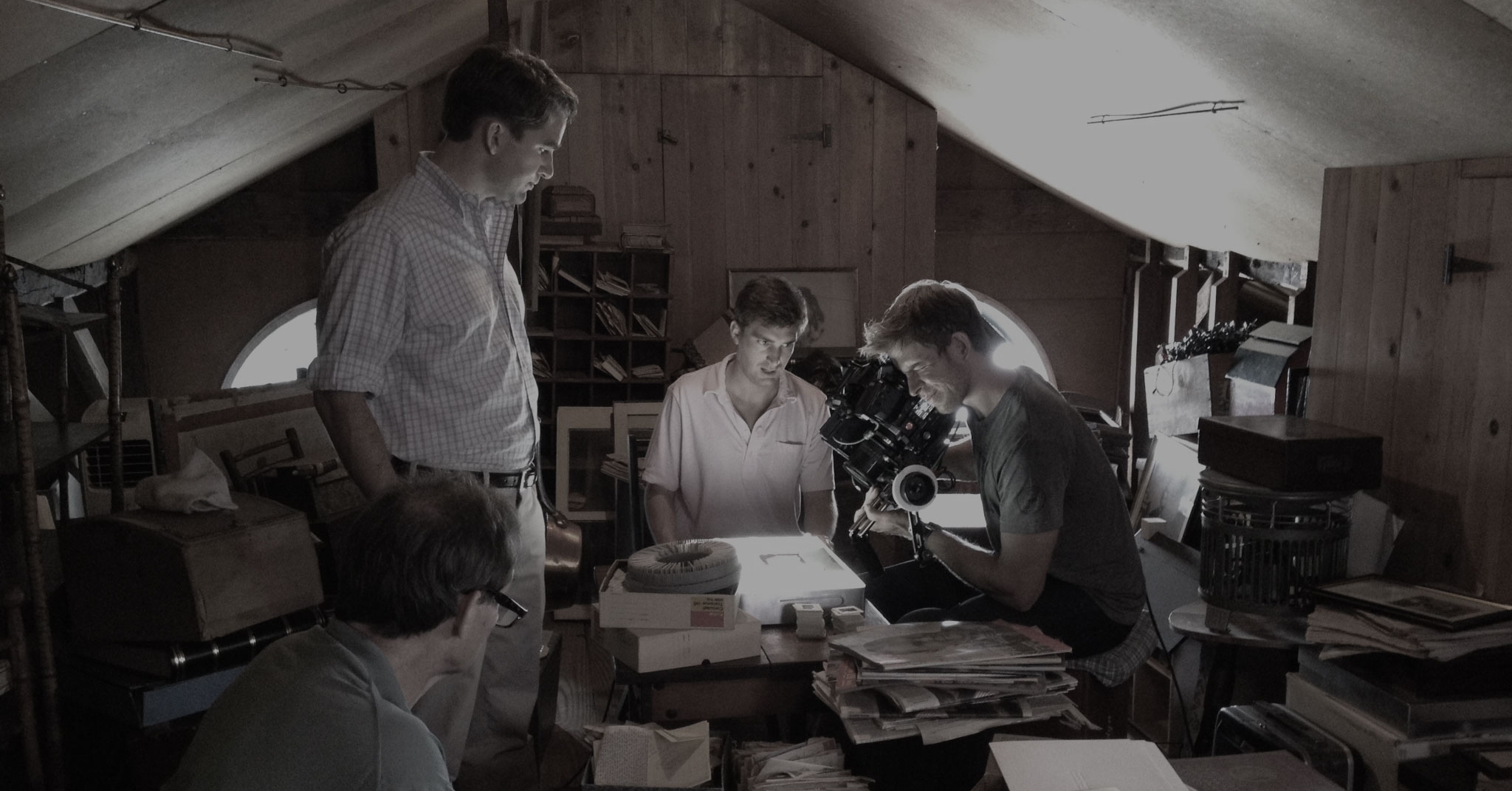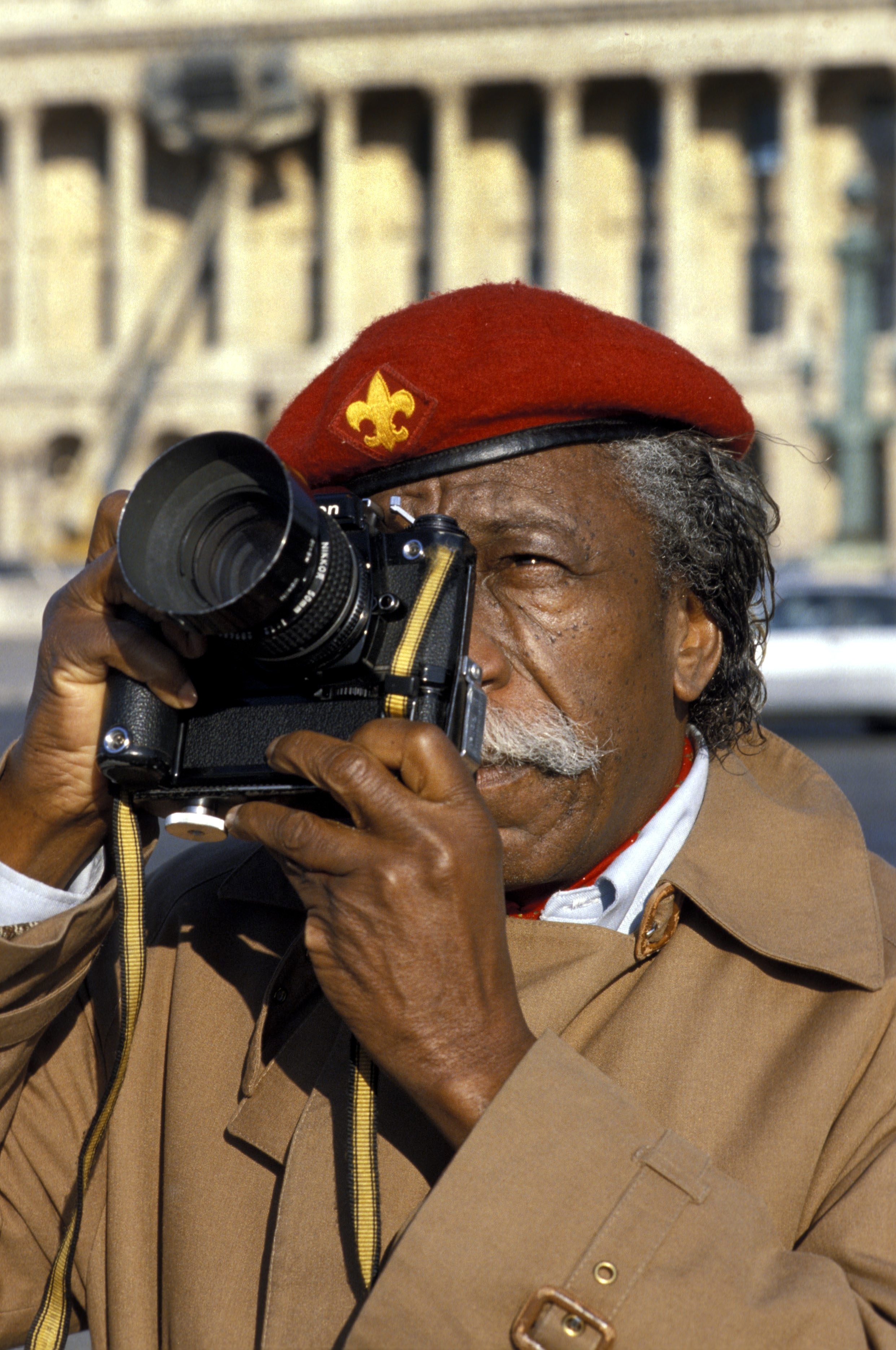Take Three
News Based on facts, either observed and verified directly by the reporter, or reported and verified from knowledgeable sources.
It’s both a labor of love and a family affair for Pleasantville-based documentary filmmaker Peter Kunhardt and his sons, George and Teddy

Good morning! Today is Monday, November 15, and you are reading today’s section of Examiner+, a digital newsmagazine serving Westchester, Putnam, and the surrounding Hudson Valley.
Need to subscribe — or upgrade your Examiner+ subscription to enjoy full access to all of our premium digital content? Details here.

Peter Kunhardt (center) with his two sons Teddy (L) and George (R). (Photo courtesy of Kunhardt Films; photo credit: Clair Popkin)
For Pleasantville-based documentary filmmaker Peter Kunhardt and two of his four children, George and Teddy, making documentaries on the people and issues that shape American history is a part of a storied family tradition. Recently, Examiner+ sat down with the three to learn more about their award-winning production company and upcoming film, A Choice Of Weapons: Inspired By Gordon Parks, which premieres tonight on HBO.
Examiner+: How did Kunhardt Films come to be?
George Kunhardt: Peter started the company in 1987 and worked with PBS and HBO for many years. And about 14 years ago, Teddy and I joined the company. Now the three of us run it together.
E+: Outside of your family, how many people work at Kunhardt Films?
GK: Our main production hub is located in Pleasantville. Out of there, we have about 15 to 20 full-time staff members that work with us across the company. Depending on the number of projects we have at any given time, we scale up or down. Right now, we’re producing a lot, so we have about 60 people working with us at Kunhardt Films.
E+: What’s it like working together?
GK: The three of us love working together. We all have our own skill sets. Peter is the overarching being and knows everything about film production, how to tell a story, how to get a deal done, and how to really shepherd a project from start to completion. Teddy and I have had the luxury and the joy of learning from him firsthand over the years.
My skill sets are more in the technical, editing, personalities, and personnel side of things. Teddy’s skill sets are more in the accounting, legal, budgeting, and the core infrastructure of how the company runs. It’s rare that you can work with your brother and father and have such a good experience. It’s pretty amazing what we have going on, and we’re excited by it.
Teddy Kunhardt: Our older brother, Peter Jr., is the director of the Gordon Parks Foundation, which is located on the first and second floor of our office building in Pleasantville. He and that foundation have their own unique story, but it’s another element to the family connection.
Peter Kunhardt: I’ll add one more generational dimension to that, which is I used to work with my father, who was the editor of LIFE Magazine. He began working on documentaries with my brother and me for many years. People would always ask us that question: ‘What’s it like to work together as a family?’ So this is kind of the next iteration of that, and it’s working very smoothly.

Behind the scenes with the Kunhardts filming a documentary. (Photo courtesy Kunhardt Films)
E+: What has producing films during the pandemic been like? Has it presented many challenges?
TK: We are in an industry that was lucky during COVID. The technology is so advanced that we could continue to do our high-scale documentaries without too much interruption. We have COVID safety procedures and we send a small film team to each location, but for the most part, the directors and the producers are all remote and we Zoom into the film location.
GK: We’re very much a remote company at the moment. We have a massive server room, an edit suite, executive offices, and research places in Westchester. During COVID, we’ve set up a really strong, secure remote setup where all of our editors, assistant editors, and everyone across the company gets the remote system that taps into our Pleasantville office so we can have people working all over the country.
E+: How would you describe the films that Kunhardt Films produces?
PK: We do a lot of stories that that touch both on history and current events going on today, especially when the two intersect. One of the words we use to describe what interests us is moral leadership. In this day and age where there’s not a lot of moral leadership, we look to individual stories where moral leadership becomes important and is reflected in the events that unfold due to it. We try to find stories that are relevant to today but have a back story where the context is very important to understand.
E+: What does the process look like in choosing projects to take on? Do PBS and HBO come to you with an idea, or are you usually pitching them?
TK: I would say more of the latter. We sit around the whiteboard, or, now, in this case, people are on Zoom and throw out names of individuals we would like to focus on. If we can get to them, how we can get to them, and if the story is worthy of the documentary. In some cases, HBO did come to us. For example, with the Ben Bradlee and Jon Meacham films, they came to us. But the rest of the films, we would bring to them.
GK: Ideas really come in all shapes and sizes. One example is when Senator McCain was diagnosed with cancer. Teddy showed Peter the New York Times that morning and said, ‘I think he’d be an amazing subject for a film.’ That afternoon, Peter called Richard Plepler, who was then the CEO at HBO, and within a week and a half, we were on a plane and met with McCain and filmed the interview. But sometimes it takes years to develop something and get an idea greenlit.
TK: There’s a lot of things that we would like to work on that we just can’t get traction around, but that’s just part of the deal. What’s surprising is, if there’s no interest in a film one year, we might pitch it a few years later and there’s interest.
E+: Will you be continuing your relationship with HBO in the future?
TK: A Choice Of Weapons: Inspired By Gordon Parks will be our last with HBO for a while. We’ve actually signed a deal with Apple, so we’ll be producing content for them.
PK: We’ve teamed up with Richard who formed a company called EDEN Productions. Kunhardt Films and EDEN Productions are developing programs right now for Apple.
E+: Can you tell me about A Choice Of Weapons: Inspired By Gordon Parks, which premieres on HBO on November 15?
PK: Gordon was a close family friend. He and my father were best friends and worked together at LIFE Magazine. We formed a foundation, The Gordon Parks Foundation, where Gordon decided to leave all of his materials to. That’s what we referred to earlier with Peter, my older son.

(Getty Images)
The mission of the foundation was to preserve Gordon’s legacy and use his work to speak to a new generation. We’ve always known it needed a documentary, and we’ve wanted to do it for years. It was something that’s been on our bucket list for a long time, and we finally have completed it and are very, very proud of it.
Gordon is one of these figures who speaks to the American people today as much as he spoke to people in his lifetime. His messages are incredibly important and are resonating with people. Our film is about how a new generation of artist-activists are using their art skills to shake things up and make points that need to be made in other ways than pure protest.
E+: Did having such a close connection to Gordon’s work through the foundation’s archive help with producing the film?
PK: Because of the family connection between us and the Gordon Parks Foundation, it meant all of Gordon’s work was at our fingertips. It would have been very hard for another company to have done it without the close access we had to the assets of the foundation.
E+: What kind of impact do you hope this film has?
GK: We want this film to reach an audience that will put Gordon into the conversation for a younger generation who may not know who Gordon is or know his work. It also is putting the limelight on young and upcoming artist-activists who in a lot of cases aren’t well-known. Their work is fantastic.
I think the film is a conversation starter for a lot of people about race in America and different social and economic inequalities. There’s a lot of different themes that we touch on in this film that Gordon’s work sheds light on. And the other characters in the film help describe what’s going on in America, both past and present.
E+: What does it feel like to put out films that spark these critical conversations?
GK: One of the things we love about making documentaries is it’s a year of hard work and then it gets put out there to the public. It’s kind of like a thesis or dissertation. You spend all the time doing it then finally have a body of work that can be shared with people. And it’s a very digestible body of work, a film.
You can show the film, then you can sit there and have a Q&A, dialogue, and discussion guide. It allows people to have very open conversations about things that they didn’t know they were feeling or thinking until they’ve watched these films. So to us, one of the best things to come out of these projects is the conversation starters.
E+: What aspects of the documentary-making process are most challenging?
GK: The biggest thing is gaining the film subject matter’s trust, and that can take a week, a year, or two years. We’re in a project right now where we’ve been building trust in conversations for almost two full years. We’re just in the early phase of pre-production because it’s taken that long to build that level of comfort. That is the number one thing to building and creating a successful film, and it’s the hardest part of it all.
Then there’s obviously the day in and day out. It’s staffing up a project properly. It takes a lot of skill, time, and temperament. You have to staff a team to create a body of work that is going to be the best thing you’ve ever produced because you’re only as good as your last work. The stakes are at the highest peak of every single production we make.
PK: It’s not only getting trust from the subject matter that we’re telling the story about but also the partners that we’re working with. It took us years to develop that kind of trust at HBO. We’ve now taken more than a year building up trust with Apple.
George said you’re only as good as your last film, and it’s true. Despite a long track record and a good reputation, there’s so much at stake in each documentary. People need to trust you. Trust is the single greatest component.
E+: How has the Pleasantville community supported your films?
TK: The people are great. We’ve been lucky. We have a good relationship with the Jacob Burns Film Center, and all of our films are screened there. We’re pleased to be in Pleasantville.
E+: Seeing as Kunhardt Films is the latest iteration of a family tradition of working together, George and Teddy, would you like your children to follow in your footsteps?
TK: George and I both have two kids. The best thing we could give them would be to continue the legacy through the Kunhardt Film Foundation (the nonprofit arm of Kunhardt Films that produces educational resources and an interview archive). That would be my dream.
Peter never put any pressure on us to do this. This is something that we came to naturally. After I graduated college, I went to culinary school and cooked for a while until I realized I didn’t want to be a chef.
Yes, I’d be proud and honored if one or both of my kids and both of George’s kids did this industry, but following how Peter was with us, I’ll make sure I put no pressure on them whatsoever. They can choose whatever they want to pursue.
PK: This tradition of family members within two generations working together goes back to the Civil War. My great-great-grandfather fought in the Civil War, and his father helped him illustrate a diary of the Civil War. My great grandfather’s illustration work turned into a huge collection of photographs on the Civil War and Abraham Lincoln.
That collection was then run by my grandmother (Dorothy Kunhardt, of Pat the Bunny fame) who worked with her father, my great-grandfather. Then my father began working with her producing Lincoln books, who then began working with my father doing Lincoln television shows and historic television shows. That’s probably the entranceway into the question you asked earlier about history. Lincoln and our family collection steered us towards history at the beginning.
TK: If you have 60 minutes to spare, we have a film on HBO called Living with Lincoln that tells this exact story of our family, the collection, and how they worked together over the generations.
PK: It wasn’t this purposeful thing where one generation was expected to help the next generation or work together. It’s just kind of unfolded that way. There was no pressure for me to work with my father. It was just something very natural, each part of this.
Bailey Hosfelt is a full-time Reporter at Examiner Media, covering LGBTQ+ issues, climate change, the environment, and more. You can follow Bailey on Twitter at @baileyhosfelt.
We hope you’ve enjoyed today’s section of Examiner+. We love honest feedback. Tell us what you think: examinerplus@theexaminernews.com

Examiner Media – Keeping you informed with professionally-reported local news, features, and sports coverage.
